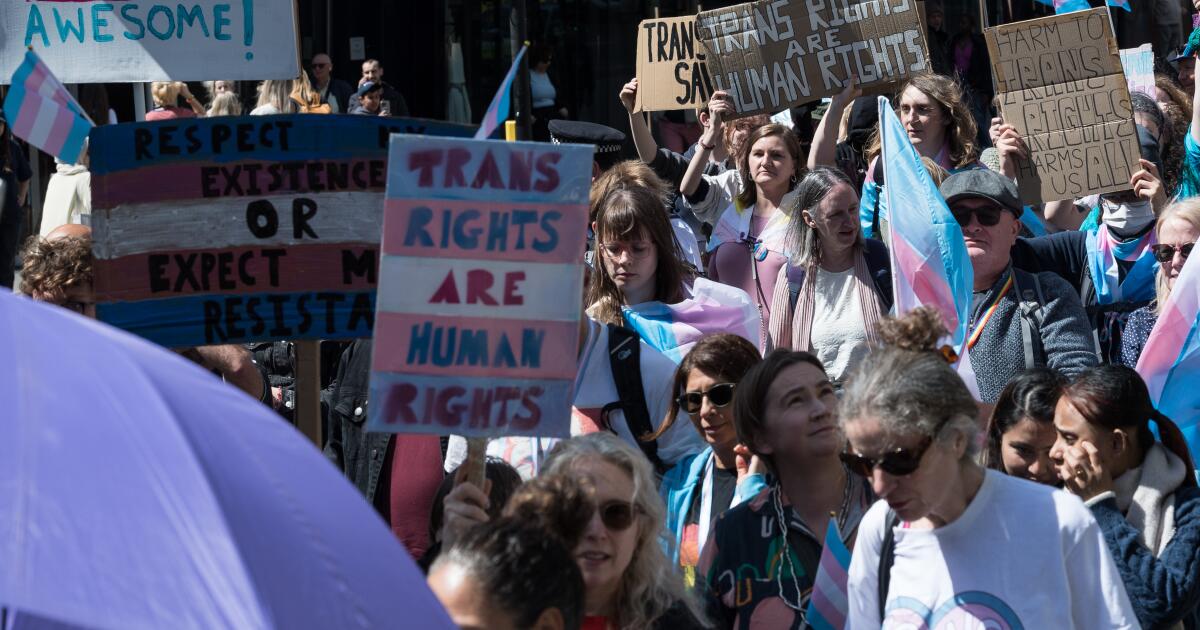Contributor: Courts can protect trans healthcare by recognizing patient-physician privilege
Information, in the second Trump administration, is a currency of power and fear. Last week, Atty. Gen. Pam Bondi announced sweeping subpoenas targeting physicians and medical providers who offer care for transgender youth. The aim is not to initiate prosecutions: Indeed, the legal theories upon which such prosecutions might rest are tenuous at best.
By filing these investigative demands, the government plainly hopes to chill medical providers from offering expert care. This strategy can work even if, at the end of the day, the government’s threats are hollow as a matter of law. The White House’s plainly unconstitutional attacks on law firms, for example, have substantially worked — even though the minority of firms to challenge the orders rapidly won relief.
Fortunately, the legal system is not powerless in the face of such overreaching: Federal district courts have the authority, and the obligation, to recognize that patient-physician dealings are akin to attorney-client and spousal discussions. Both of the latter benefit from judicially created privileges — or legal shields that individuals can invoke against the state’s probing. At a moment when not just gender medicine but also reproductive care more generally is in peril, federal courts can and should step in and shield intimately private medical data as well.
We suspect that many people believe that what they tell their doctors is already private. They’re right, but only sort of. There’s a federal law called HIPAA that limits what your doctor can do with the information. It says that your doctor can’t, for instance, sell your medical records to the newspaper. In 2024, the Department of Health and Human Services also issued a HIPAA “privacy rule” that heightened protections for reproductive healthcare information. (Last month, a federal district court in Texas declared the rule unconstitutional — so its future is uncertain.)
Even with the privacy rule, however, HIPAA hides a gaping hole: It allows disclosures “required by law.” And the law explicitly permits disclosures pursuant to subpoenas of all kinds — judicial, grand jury or administrative — including those issued by Bondi. So if the Justice Department subpoenas your intimate and sensitive healthcare information, HIPAA won’t stop that.
In previous academic work, we’ve urged Congress and state legislatures to fill this gap. Blue states have acted to curtail cooperation with other states — but there’s a limit to what states can do when the federal government demands information.
Yet there remains one entity that can, and should, act immediately to shield reproductive healthcare information: the same federal district courts that have been at the forefront of pushing back on the Trump administration’s many illegal and constitutional actions. We think federal courts should extend existing “privileges,” as evidentiary shields are called, to encompass both records of gender-affirming and transgender medical care, and also records of reproductive care more generally.
A privilege not only bars protected information from being admitted into evidence at trial, but also blocks subpoenas, warrants and other court orders.
Federal district courts have a general power to create privileges, and they often do so when people already have a reasonable expectation that their conversations will not be disclosed. Most people have heard of the attorney-client privilege, which means that you can confide in your lawyer without worrying that what you say will end up being used in court. But privileges can apply to all sorts of other information as well: what you tell your spouse, what you tell your spiritual advisor and even highway safety data that your state reports to the feds in exchange for funding. Existing court-created privileges protect not only attorney-client but also executive-branch communications.
Federal courts should recognize a privilege for doctor-patient communications in gender and reproductive medicine. They could do so if one of the physicians subpoenaed recently goes to court. The protection they seek is simply an extension of widely recognized legal principles and expectations of privacy. Federal courts already have recognized a privilege for patient communications with psychotherapists, and many state courts also offer privilege protections for broader doctor-patient communications.
Importantly, it is the job of federal district courts to craft evidence-related rules. After all, these are the judges who are closest to litigants and the mechanics of evidence protection. District courts don’t need to wait around for the Supreme Court to act on this, because the Federal Rules of Evidence left privileges to common law development in the district courts. And under the well-established balancing test that lower federal courts should follow when they create new privileges, we think our proposed privilege is an easy case: It serves a public purpose and protects what should be recognized as a valued interest of “transcendent importance” — privacy for our most intimate medical care.
The case for recognizing the privilege in respect to the recent subpoenas is especially strong: The attorney general is seeking to chill physicians from providing advice that is protected by the 1st Amendment and care that is guaranteed by federal statutes. Such subpoenas are directly at odds with the rule of law.
Today, it is trans kids; tomorrow, it will be people seeking an abortion or contraception. We should not have to wait for the federal government to go this far before our privacy gets the shield that it deserves.
Aziz Huq and Rebecca Wexler are professors of law at the University of Chicago Law School and Columbia Law School, respectively.


